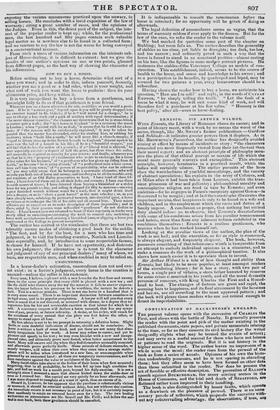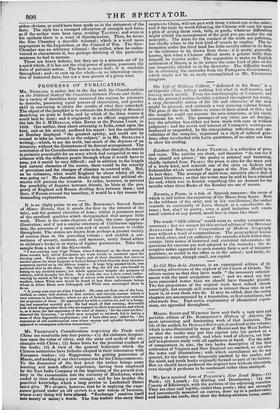CONTINUATION OF MACKINTOSH'S ENGLAND.
Tan present volume opens with the succession of CHARLES the First, and closes with the battle of Nasehy. It generally presents the reader with the point and pith of the matter existing in the published documents, state papers, and private memorials relating to the time, so far as they concern its civil history (for the writer designedly slights what may be termed the events of action).i and may serve as a useful manual for those who have not leisure or patience to read the originals. But it is not history in the higher sense of the word. The author leaves no impression of a whde upon the mind; the reader rises from the perusal of the book as from a series of annals. Opinions of his own the histo- rian undoubtedly possesses, and he is not sparing in obtruding them ; but they often seem to have been formed on other data than those submitted to the reader. Nor does he possess the art of forcible or effective description. The peroration of ELLtais speech against BUCKINGHAM, the many stirring scenes in the House of Commons, and the trial and death of STRAFFORD, are flattened rather titan improved in their handling. The book is also distinguished by lesser faults, which operate as a drawback on the pleasure of perusal. There is an untie cessary parade of reflection, witichquspends the narrative with- out any countervailing advantage, the observations, if true, era either obvious, or could have been made so in the statement of the facts. The style has a cramped affectation of strength and force, as if the author were bent upon writing TACITUS ; and even in his epithets there is a want of discrimination. Thus, he terms the Star Chamber a horrible tribunal; which is a word more appropriate to the Inquisition, or the Council of Ten. The Star- Chamber was an arbitrary tribunal : the author, when he endea- voured to characterize it, was perhaps thinking of the particular sentence he had to narrate.
These are heavy defects; but they are in a measure set off by a spirit which, if it has not the vital power of genius, possesses the force of galvanic action. The book is never dull ; it is readable throughout; and—to sum up the whole—is an interesting narra- tive of historical facts, but not a true picture of a given time.



























 Previous page
Previous page